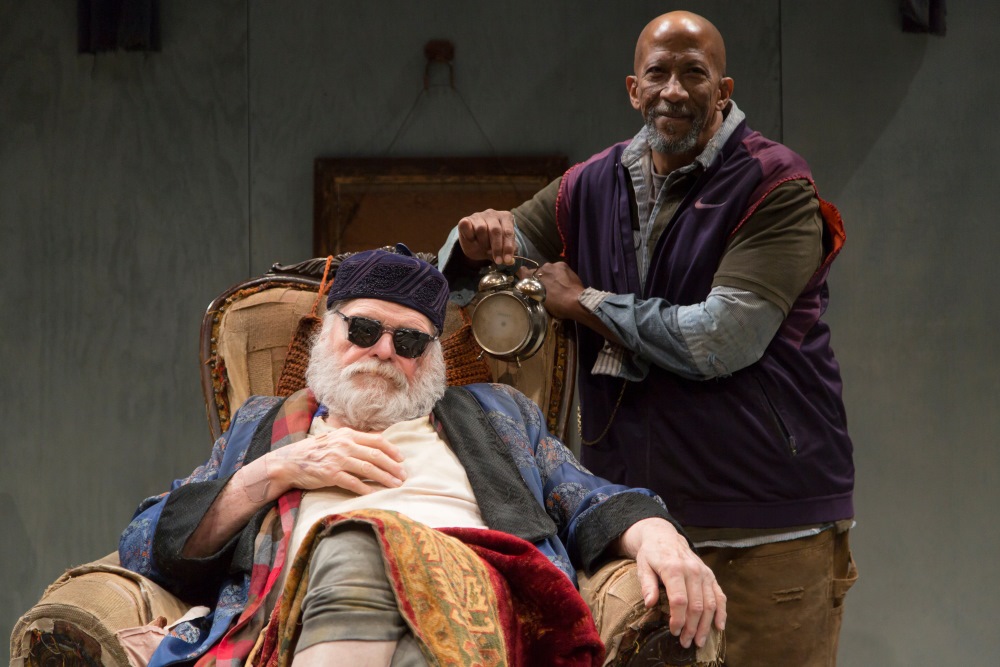Reg E. Cathey, known for roles on “House of Cards” and “The Wire,” has acted onstage in Julie Taymor’s The Green Bird and in Talk, for which he won an Obie. Next he appears opposite Brian Dennehy in Beckett’s Endgame at Long Wharf Theatre in New Haven, Conn., Jan. 5-Feb. 5.
What’s your first theatrical memory?
I grew up in Germany. My dad was an Army officer, and my mom worked for the Department of Defense. I saw a USO show of Guys and Dolls when I was 9 years old, and I remember Adelaide coming out wearing a towel and singing, “A person could develop a cold.” I thought, “This is what I’ve got to do.” I wanted to do something where women were walking around in towels.
You came back to your birthplace of Alabama as a teen in the early ’70s. How did that transition affect you?
If you were a black kid on an Army base, you didn’t just represent your parents and your country but every black person in America. So we were taught very young that you don’t fight, you spoke well, you stood up straight and you put forth your argument forthrightly. When I came back to America it wasn’t like that at all. You didn’t have to represent anybody but yourself. It was very difficult for me. But you come to understand we’re evolving. We’re not what we were, and we’re not what we’re going to be.
Have you done Beckett before?
This is my first time, I think, though I did some at school.

What was your experience like at Yale of School of Drama in the early ’80s?
Looking back on it, it was fabulous and I made friends for life, but it was so much work and really difficult emotionally too, because of the death of two of our acting teachers, Norma Brustein and Rachel Roberts. It was sad, and it really affected us in ways that were profound. I remember Andrei Belgrader coming in; he took one look at us and said, “Okay, you guys are traumatized,” and he took us all out for coffee. Later he had us pick a scene to do but said, “You have to be terrible. You have to do all the bad acting you can.” It was the most fun class ever. His point was that it’s okay to fail because that’s the only way you’re going to get better. I kept that lesson.
What were some of your unusual early acting jobs?
I worked with Anne Hamburger’s site-specific group En Garde Arts in New York. In one show I flew down the rafters in a play set in an old porno house. Another was in Mac Wellman’s Bad Penny, where I had waders underneath my costume and I had to go into a pond in Central Park. I remember coming out once and four rats came out before me, and I went, “Oh, fuck.” After that, we would go out and beat the weeds and chase the rats away before each show.
If you weren’t an actor what would you do?
I played the sax, and I thought I was going to be a jazz musician like Lester Young. That was my childhood dream, and then we moved back to America and the dream died on the vine. But I still play the sax.
Did you have role models or acting influences when you were starting out?
There’s a guy at Western Michigan University, Dr. Von Washington, who taught a bunch of us, like Ruben Santiago-Hudson and David Alan Grier. He’s still in Detroit, and he was very instrumental.
My very first acting teacher in Alabama, Ron Harris, was influential too. He stressed that you can’t act like someone and act the part. I remember when I first became an actor every casting agent would say, “Oh, you’re a young Morgan Freeman.” I would cringe because I knew Morgan really didn’t begin to work a lot until he was in his 50s.
How has the acting profession changed for you over the years?
When I became a professional there was the attitude that if you were black there were roles you just did not audition for. There was a whole pride of not doing what we called “coon” shows and stereotypical parts. Now fast-forward, and I’m in L.A. and all of the jobs are going to rappers. So here’s this new art form that is the worst images of blacks. So I think of all of those years I turned down that work. It’s crazy—the very thing we were working against is what’s being celebrated now.
Do you have any theatrical pre-show rituals?
I do, but I have a superstition against talking about it. If I talk about it, it won’t work.


